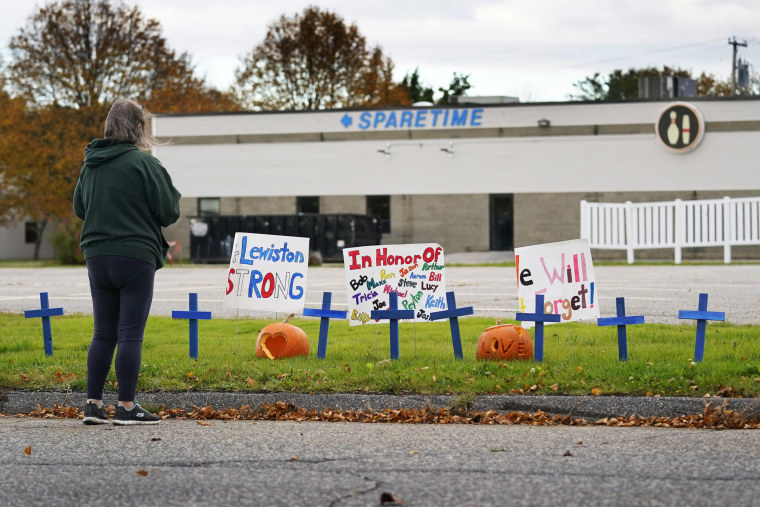Almost 10 months after an Army reservist’s deadly rampage in Lewiston, Maine, an independent commission said Tuesday that local law enforcement and the U.S. military had missed “several opportunities” that, if taken, “might have changed the course of these tragic events.”
While the independent commission’s final report found that gunman Robert Card was solely responsible for his own conduct, other lapses played a role, including:
- A Sagadahoc County Sheriff’s Office sergeant conducting a welfare check on Card weeks before the shooting had “sufficient probable cause” to take him into protective custody under state law.
- The leaders of Card’s Army Reserve unit “failed to undertake necessary steps to reduce the threat he posed to the public,” such as ignoring “strong recommendations” from his mental health providers to stay engaged with his care and ensure any weapons in his home were removed, and they “neglected to share” with the local sheriff’s office all of the information they knew about past threats he had made.
- The gunman’s company commander had the ability to store service members’ personal firearms and failed to properly check back in with Card after he was placed in a psychiatric unit last summer while at an Army training in West Point, New York, where he got into a physical altercation with another reservist.
- Medical staff at Keller Army Community Hospital in West Point, where Card was initially evaluated last summer, failed to file a so-called SAFE Act notice, which is used to alert when someone may be a danger to themselves or others.
Maine Gov. Janet Mills launched the commission a month after the Oct. 25 shooting claimed 18 lives at a bowling alley and bar.
The commission, made up of former state judicial and legal officials and medical experts, held more than a dozen hearings, gathering testimony from local law enforcement, military members, survivors of the shooting, families of those killed and the family of the gunman. The panel said it was tasked to “find the facts” so that law enforcement, military leaders and elected officials could reduce the risk of such a tragedy reoccurring.
Commission Chairman Daniel Wathen said at a news conference Tuesday that the investigatory process was slowed by Army bureaucracy in obtaining information, but that the military remained cooperative. He added that he expects Maine State Police to conduct its own after-action review.
The gunman, 40, was found dead by suicide after a two-day manhunt.

The commission released an interim report in March that criticized a Sagadahoc County Sheriff’s Office sergeant who was alerted by Card’s family about his deteriorating mental health and conducted a welfare check about five weeks before the shooting. The commission said the sergeant had probable cause to initiate Maine’s “yellow flag” law, which allows law enforcement to confiscate a person’s firearm if they are believed to be a threat to themselves or others.
But the sergeant said law enforcement was stymied at the time because Card refused to answer his door.
The commission noted that the state’s “yellow flag” law “may sometimes be cumbersome.” In April, Mills signed a bill to bolster the legislation, including allowing police to get protective custody warrants from a judge for those who may be a danger and possess firearms.
In the wake of the shooting, scrutiny also fell on the military.
Card was an Army reservist for two decades and a longtime hand grenade training instructor. Family members told the commission in May that they had tried to reach out to the Army last year, given their concerns about his mental health and access to guns, but that their calls went unreturned or unanswered.
An internal military report investigating the Army’s response laid out how Card’s unit failed to follow certain procedures after he was involved in a shoving incident with another reservist in July 2023, leading him to be hospitalized in a psychiatric unit at a civilian hospital for two weeks. At the time, his reported symptoms included psychosis and homicidal ideations and he had created a “hit list,” according to the military’s investigation.
The Army prohibited Card from having access to weapons while on duty.
But his unit did not conduct a required “line of duty investigation,” which would have also documented the condition of his mental state, and the report also noted that Card’s chain of command was not given any information regarding his diagnosis, prognosis or discharge instructions. There were also communication gaps between the Army and the civilian hospital, the report found, which can be improved in future cases.
Ultimately, a military investigator concluded that “even a flawless execution by Army personnel in every identified area would likely not have prevented the tragic events,” and shifted responsibility onto the local sheriff’s office, who if it “had fully executed their health and welfare check” on the gunman, “then the mass shooting and suicide may have been avoided.”
Lawyers for families of the victims have complained that the various agency investigations have given conflicting conclusions about who should be held accountable. They are still seeking a broader investigation by the Inspector General for the Department of Defense.
Card’s family has said they worry that his years of being exposed to low-level blasts as a hand grenade instructor in the military was tied to the “severe” traumatic brain injury that researchers found evidence of earlier this year.
The military in its report denied that any brain-related injury was linked to his military service. Still, the military said it would begin conducting “baseline cognitive assessments” for its trainees this summer and develop improved protective equipment to minimize blast exposure.
As for a definitive motive for the massacre, Card’s family could not offer one to the commission in May.
“We could ask a million whys for the rest of our lives,” Cara Lamb, the shooter’s ex-wife who shared a son with him, testified, “and never have a good enough answer.”





